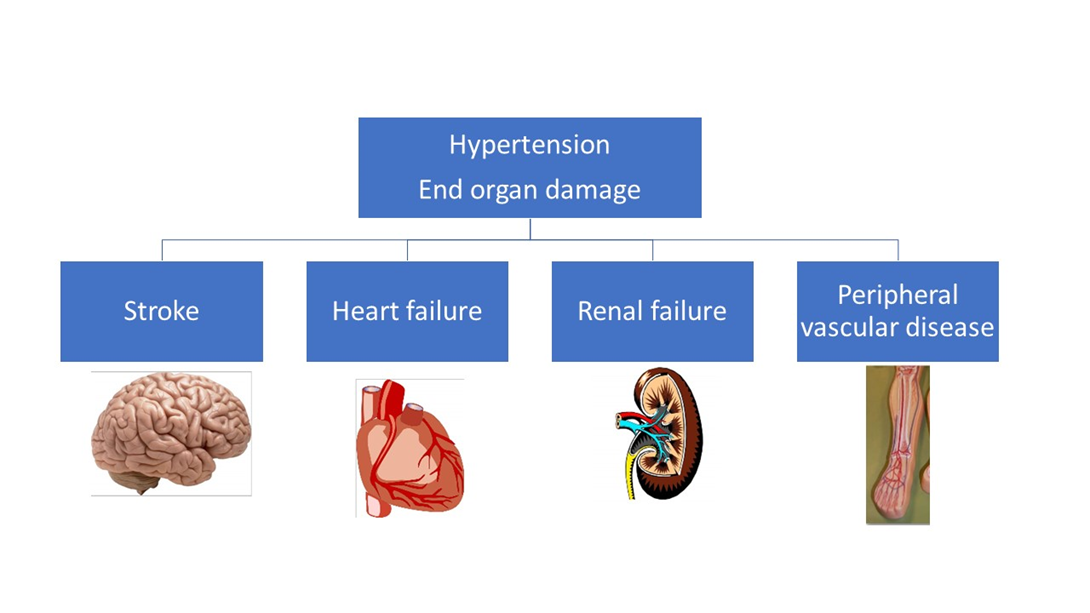Which are potential results of end-organ damage from chronic hypertension? (Select all that apply.)
Isolated systolic hypertension
Atrial fibrillation
Renal insufficiency
Stroke
Cardiac disease
Correct Answer : B,C,D,E
Choice A reason: Isolated systolic hypertension is not a result of end-organ damage from chronic hypertension, but rather a risk factor for it. Isolated systolic hypertension is a condition where the systolic blood pressure is elevated (>140 mmHg) while the diastolic blood pressure is normal (<90 mmHg). It is common in older adults due to the stiffening of the arteries, and can increase the risk of cardiovascular and cerebrovascular events.
Choice B reason: Atrial fibrillation is a result of end-organ damage from chronic hypertension. Atrial fibrillation is an irregular and often rapid heart rate that can cause poor blood flow and increase the risk of stroke and heart failure. Chronic hypertension can damage the heart muscle and the electrical system of the heart, leading to atrial fibrillation.
Choice C reason: Renal insufficiency is a result of end-organ damage from chronic hypertension. Renal insufficiency is a condition where the kidneys are unable to filter waste and fluid from the blood adequately. Chronic hypertension can damage the blood vessels and the nephrons of the kidneys, leading to renal insufficiency.
Choice D reason: Stroke is a result of end-organ damage from chronic hypertension. Stroke is a sudden interruption of blood supply to the brain, causing brain cell death and neurological deficits. Chronic hypertension can damage the blood vessels in the brain, making them prone to rupture (hemorrhagic stroke) or blockage (ischemic stroke).
Choice E reason: Cardiac disease is a result of end-organ damage from chronic hypertension. Cardiac disease is a broad term that encompasses various disorders of the heart, such as coronary artery disease, heart attack, heart failure, and cardiomyopathy. Chronic hypertension can damage the heart by increasing the workload and the oxygen demand of the heart, causing the heart to enlarge and weaken over time.

Nursing Test Bank
Naxlex Comprehensive Predictor Exams
Related Questions
Correct Answer is ["A","B","D","E"]
Explanation
Choice A reason: This is a correct answer because Alzheimer's disease affects the brain cells and causes them to degenerate and die. This leads to a gradual decline in cognitive abilities, such as memory, language, reasoning, and problem-solving.
Choice B reason: This is a correct answer because Alzheimer's disease interferes with the daily activities and routines of the affected person. They may experience a decline from their previous level of functioning, such as forgetting appointments, misplacing items, or getting lost.
Choice C reason: This is an incorrect answer because easily frustrated is not a specific outcome of the early stage of Alzheimer's disease. Although some people with Alzheimer's disease may become frustrated, irritated, or angry due to their cognitive impairment, this is not a universal or diagnostic symptom.
Choice D reason: This is a correct answer because Alzheimer's disease affects the short-term memory first, causing the person to forget recent events, conversations, or names. This is called mild memory loss, and it is one of the most common signs of the early stage of Alzheimer's disease.
Choice E reason: This is a correct answer because Alzheimer's disease affects the frontal lobe of the brain, which is responsible for executive functions, such as planning, organizing, decision-making, and judgement. This leads to impaired judgement, such as making poor financial choices, neglecting personal hygiene, or acting inappropriately.
Correct Answer is A
Explanation
Choice A reason: Avoiding sick people and washing hands is the most important client teaching for the nurse to include for the prevention of hospitalizations for exacerbations of COPD, as it can reduce the exposure to respiratory infections, which are the main cause of COPD exacerbations. The nurse would advise the older adult to stay away from people who have colds, flu, or other contagious illnesses, and to wash their hands frequently with soap and water or use alcohol-based hand sanitizer.
Choice B reason: Using low-flow oxygen for dyspnea is a possible client teaching for the nurse to include for the prevention of hospitalizations for exacerbations of COPD, but it is not the most important one, as it depends on the severity of the condition and the oxygen saturation level of the patient. The nurse would advise the older adult to use oxygen therapy as prescribed by their doctor, and to monitor their oxygen level with a pulse oximeter.
Choice C reason: Easing breathing by sitting upright is a helpful client teaching for the nurse to include for the prevention of hospitalizations for exacerbations of COPD, but it is not the most important one, as it is a supportive measure that does not address the underlying cause of the exacerbation. The nurse would advise the older adult to sit upright or lean forward when they have difficulty breathing, and to use pursed-lip breathing or abdominal breathing techniques.
Choice D reason: Eating nutrient- and calorie-dense foods is a beneficial client teaching for the nurse to include for the prevention of hospitalizations for exacerbations of COPD, but it is not the most important one, as it is a long-term strategy that does not prevent the immediate risk of exacerbation. The nurse would advise the older adult to eat a balanced diet that provides enough protein, carbohydrates, fats, vitamins, and minerals, and to avoid foods that can cause gas, bloating, or reflux.
Whether you are a student looking to ace your exams or a practicing nurse seeking to enhance your expertise , our nursing education contents will empower you with the confidence and competence to make a difference in the lives of patients and become a respected leader in the healthcare field.
Visit Naxlex, invest in your future and unlock endless possibilities with our unparalleled nursing education contents today
Report Wrong Answer on the Current Question
Do you disagree with the answer? If yes, what is your expected answer? Explain.
Kindly be descriptive with the issue you are facing.
